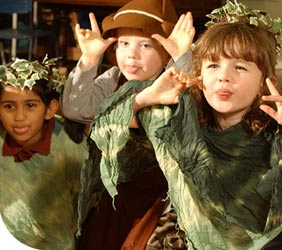
Our Summer Experience holiday courses started last week and, by all accounts, the first week went really well. I’ve had lots of great feedback from parents about the shows on the last day.
Even though it is really the learning process and enjoyment that’s most important to us, the performances don’t put themselves together. They take a lot of planning and hard work by our dedicated teachers and, of course, a huge amount of energy, effort and team work by the children.
Many people believe that working as a team does not come naturally to children. They argue that kids are essentially self-interested and focused on their own desires rather than the needs of the wider group.
While this may be the case, I disagree that children cannot be good team-players. Of all the art forms, theatre is one of the most collaborative and I have seen children work together wonderfully to create performances that are much greater than the sum of their parts.
However, I do think that their natural team-working abilities need to be encouraged and fostered. After all, working together productively with others is an essential life skill. Team work is something we will use in employment, with friends and, of course, in family life - in fact, raising children is the area where I am learning the most about working as a team.
Based on my twenty years of experience of working with children, here are five ways to help children work together as a team:
1) Foster a group mentality
Talk to the children about what the group is trying to achieve and inspire them to imagine how they will feel when the group goal is met. For example, I always get the children to imagine how their parents will feel when they walk into the room and see everybody ready to perform in costume.
2) Make sure each child understands how they fit in to the group
Take the time to talk to each child individually about their own unique contribution and how it will help to create the big picture. For example, we always talk to a child about their role and why it is important to the plot and to the audience’s appreciation of the show.
3) Encourage interaction between ALL members of the group
Try to avoid the group fragmenting into smaller cliques by making sure children work together with those that they have had little or no contact with. This will help create a wider range of individual bonds and can inspire new friendships, loyalties and creative partnerships.
4) Give smaller groups decision-making responsibility
Children are very used to being told what to do and this is constantly reinforced by parents and teachers with phrases such as ‘Do as you are told’. Giving smaller groups the responsibility to make creative decisions amongst themselves can inspire excellent results and a real ownership of the finished product.
5) Create bonds of trust, respect and friendship
At the heart of all successful teams is mutual support and respect between the members - and children are no different. We use games and exercises that develop trust and understanding between individual children and, over a remarkably short time, these can lead to real lasting friendships. These relationships anchor the group and can spark new bonds, strengthening and developing the team further.
For more information about how Perform’s holiday courses can help children work as a team, build confidence and make new friends, please click here.




